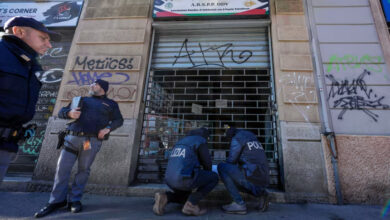As results from Italy’s general elections on 24–25 February began trickling through, it was clear that the country’s scandal-ridden political class had received a wake-up call.
Berlusconi put a on brave face by emphasizing his comeback. But gaining 5 percentage points on his all-time low of 17 percent in December would be nothing to cheer about, had his opponents’ campaign not been such an unmitigated disaster. The Democratic Party was expected to win comfortably, and yet one of its leaders, Piero Fassina, sat stumped for words live on television, incredulous as he saw early results trickling in.
Not only did the Democrats have a meager lead on Berlusconi’s coalition, but they were being seriously challenged by a political movement that had never run in general elections, and didn’t even exist until a few years ago. Led by former political satirist Beppe Grillo, the Five Star Movement, or M5S, ran on a platform of social justice and rule of law, which resonated with many Italians, tired of the old political class’s unwillingness to reform.
Particularly at this time of austerity, when working people’s jobs and finances are being hit hard to pay for a crisis they were not responsible for, the lavish lifestyle of the political elites and their inability to pass seemingly basic reforms such as effective anti-corruption legislation deeply jarred with much of the Italian electorate.
Much to everyone’s surprise, the M5S ended up being the largest single party by share of the vote, with 25.5 percent of the vote for the Chamber of Deputies (109 seats) and 23.8 percent in the Senate (54 seats). The rest of the results for mainstream parties tell the story of defeat that is virtually unequaled in Italy’s post-war history.
The Democratic Party coalition obtained 31.6 percent in the Senate (120 seats). In the Chamber of Deputies, its 29.54 percent share won it 345 seats, thanks to Italy’s controversial election law designed to keep new parties out, which automatically awards the largest coalition 55 percent of seats. But the party itself got only 25.4 percent of the vote, down from 33.18 percent in 2008.
Berlusconi’s coalition obtained 30.7 percent in the Senate (117 seats) and 29.1 percent in the Chamber of Deputies (125 seats). But his own party received a meager 21.56 percent of the vote, a massive drop from 37.38 percent in 2008. Mario Monti’s hastily gathered list, which had hoped to attract centrists and conservatives, obtained a miserable 9.1 percent (18 seats) in the Senate, and 10.5 percent (47 seats) in the Chamber — his grouping is nowhere near to being the decisive political force he had hoped it would be.
How did the Five Star Movement do so well? M5S is a young political organization — as well as a political organization made of mostly young activists — with a very strong emphasis on honesty and transparency in public life, as well as on social and economic justice, which has attracted voters from across the political spectrum and from across the country. Commentators and the M5S itself strongly emphasize the movement’s reliance on the Internet as a tool of political organization, but many voters and activists have been attracted also by a “conventional” political approach based on openness and on mass mobilization in squares across Italy, rather than relying on television and newspapers.
But the success of M5S is also a product of the old political class’s failures. The challenges Italy faces are daunting. Unemployment and underemployment are rising steadily, particularly among the young. Small and medium enterprises, which have traditionally been the backbone of the economy, are suffering badly.
In this context, the Bank of Italy estimates that every year, the country loses more than 120 billion euros in tax fraud, corruption is estimated to cost 60 billion to 100 billion euros a year, while organized crime is conservatively estimated to be worth about 150 billion euros. Both Berlusconi and his traditional opponents on the left have been in government over the past 20 years, and neither have been willing or able to begin tackling these problems.
They have remained, however, the most numerous and best-paid political class in Europe, with parliamentary salaries averaging 15,000 euros — more than LE130 million — per month. They are also the most scandal-ridden in Europe, with 10 percent of the former parliament being either under investigation or sentenced, including Berlusconi himself, and close allies of his, like Cesare Previti, who has been found guilty of a decades-long association with the Palermo’s notorious mafia.
This political and economic context explains why the new parliament faces deadlock. In the Chamber of Deputies, the Democratic Party-led coalition has a 55 percent majority, thanks to Italy’s controversial election law, but in the Senate, no single party or coalition has a majority, and in Italy, the two houses of parliament have exactly the same powers. The only possible majorities are between two of the first three parties — the Democratic Party, or PD; Berlusconi’s People of Freedom, or PdL, party; and M5S.
However, an alliance between M5S and the PdL is impossible, because the entire platform of the M5S is built against the moral, legal and financial corruption of the old system Berlusconi represents. A PD-PdL alliance would be the political kiss of death for the Democrats, already tainted by their past collaboration with Berlusconi.
Meantime, the M5S will be carefully trying to avoid the accusation of stalling the entire Italian political system. Most observers agree that a second round of general elections will be necessary.
In the short term however, the most likely scenario is a PD-led government, which will need M5S support in the Senate — leverage the M5S will try to use to push through key reforms in its program, including laws on key issues like corruption, elections and the media. These laws may seriously damage Berlusconi’s financial interests, and he will certainly try to discredit the PD as subjugated to the European Union’s directives and paint the M5S as irresponsible, as well as simply attempting to buy off opposition parliamentarians, as he famously did in the past.
Italy’s precarious political equilibrium is worrying to key European leaders because its economy is simply too big to fail, and if Italy were to renegotiate its relationship with its European creditors, any concession might have significant consequences on countries like Greece and Spain. But more widely, what the success of the M5S represents is a challenge to the approach to economic reform, which has too often rewarded the rich responsible for the problems, while making the working classes pay for Europe’s economic mess.
Italians are neither Euro-skeptic nor against economic reforms per se, but they want to see growth and jobs, they want to see effective anti-corruption measures and they want to see tax evasion tackled. This is something they have in common with their counterparts north and south of the Mediterranean.
The EU and its most powerful member states have thus far ignored those calls and preferred reforms that weaken working Italians by increasing their taxes, cutting services and making their jobs less secure. Italy’s electoral result, like previous protest movements in Greece and Spain, is a wake-up call to Europe’s elites that the question of social justice cannot be ignored.
Andrea Teti is director of the Centre for Global Security and Governance, and lecturer in international relations at the University of Aberdeen, as well as senior fellow at the European Centre for International Affairs.




